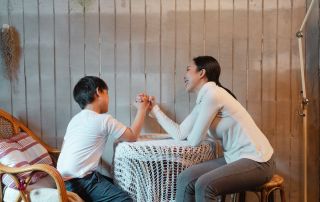
Source: Lauren Lulu Taylor/Unsplash
I don’t recall roughhousing with my children, and I am certain my parents didn’t roughhouse with me. When I try to come up with a list of parents who roughhouse with their children now, it’s painfully short. Whether it’s because children are often “overbooked” with activities and spend much if not all of their free time on devices or that parents are too busy or worry about the safety of twirling their toddler or wrestling with an 8-year-old (or all of the above), everyone misses out.
The concept of roughhousing may make you nervous. When we think of children’s roughhousing, we think of fighting or someone getting hurt. I used to send my kids outside to “cool off” when their inside interactions escalated and became too physical. But parent and child horseplay is an entirely different story with a wide range of proven benefits.
For decades, Peter Gray, Ph.D., research psychology professor at Boston University and one of the foremost proponents of children’s play, has been telling parents that play is essential for children’s healthy development. His research demonstrates that “Free play is the primary means by which children learn to control their lives, solve problems, get along with peers, and become emotionally resilient,” as he explains in his book, Free to Learn: Why Unleashing the Instinct to Play Will Make Our Children Happier, More Self-Reliant, and Better Students for Life.
Although Gray posits activities that are not adult-driven or supervised, there is also enormous value in parent–child play. It, too, can “unleash” many of the same benefits associated with undirected and unmonitored peer play. Children are driven to play, Gray tells us, and it’s a good bet most children will sign on to having a parent’s full attention even when the play is not fully free and unstructured.
Anthony DeBenedet, MD, and play therapist Lawrence Cohen, Ph.D., both fathers, make the point that play not only brings parents and children closer but also unlocks creativity and encourages confidence in children. In their book, Unplug and Play, The Ultimate Illustrated Guide to Roughhousing with Your Kids, they offer instructions with pictures for a wide range of activities broken down by age and type. An activity titled “Just Plain Wrestling” is recommended for children aged 2 years and older. The degree of difficulty is listed as easy, with no actual grappling skills required.
In another one-on-one activity, the parent is the base and the child the flyer. You can also turn your child into a “Greek catapult,” where you launch your child into the air (within reason) onto a soft surface, like a mattress, or their feet. This is best for 5- to 8-year-olds; degree of difficulty, medium; essential skill: spotting. Each entry has full directions that include safety precautions parents can take to prevent injury. Think pillow fights, human cannonballs, and magic carpet rides as some of the ones you will want to jump into right away.
Roughhousing Guidelines
The authors offer detailed guidelines for successful roughhousing, among them the following:
- Don’t surprise your children by starting any horseplay activity if they are not ready.
- Roughhousing has a natural arc—start calm and escalate to high intensity, always allowing for wind down before stopping.
- Avoid overstimulating your child. You can slow down by speaking softly, moving at a slower pace, or taking breaks.
- Let your child win sometimes to build the confidence a child needs when not at home.

Source: Ketut Subiyanto/Pexels
When I spoke to Michael Schroeder, a father of four, and freelance writer and editor, he said that physical play is something he grew up with—and that it has always played a role in how he interacts with his kids, ages 6 through 13.
“Wrestling is a regular feature in our house,” Michael says. “It’s one more way we have fun together, and it’s easy to see how anxious energy dissipates and connection happens with physical play. It seems to loosen everybody up.”
Regular physical play can reinforce a positive family dynamic, like dancing in the living room or enjoying any other pastime together. I watched a friend dangle her year-and-a-half-year-old by his feet upside down and then set him upright on her shoulder. The little boy laughed the entire time. I think this mother has already established a sense of trust through their physical contact.
Confidence Essential Reads
Surprising Benefits of Horseplay
Where better to start and encourage valuable skills than at home with the security of parents? You may want to stop leaving the roughhousing to the kids, their siblings, or peers. You can quickly reap the benefits—yours and your children’s—that grow out of parent–child roughhousing. DeBenedet and Cohen offer potential pluses you wouldn’t expect to result from ditching the electronic devices and roughhousing with your children that also include the following:
- Unlocking a child’s problem-solving skills
- Helping a child understand fair play
- Building a child’s confidence
- Instilling a lifetime bond because you become attuned to one another
Taking a few minutes to roughhouse—to become an elephant or elf, a bulldozer or the bearer of a magic wand—with your child pays off in the sheer joy you both feel. And, as DeBenedet and Cohen point out, studies suggest that physical play with your kids “forestalls mental decline” in adults.
No matter how exhausted you feel, a quick romp revives you and adds to the family memory bank. I know this for a fact. Off and on, I became the “Kissing Monster.” Chasing my kids around the house to give them a kiss was not only fun but also horseplay that they, as adults, still talk about.
For children, play is learning, however you and they choose to do it.
Copyright @2023 by Susan Newman
